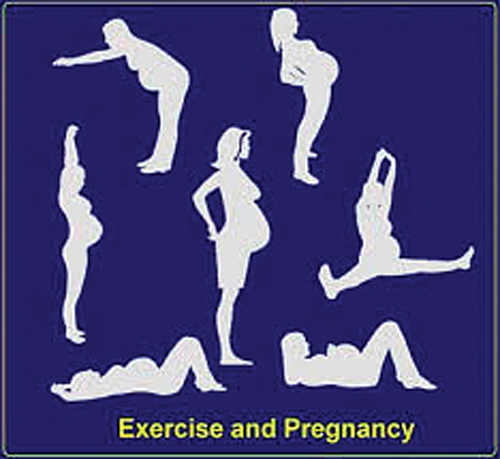.jpg)
Long gone are the days of women being considered in “delicate condition” during normal pregnancy. Pregnant women today can be seen running competitively, working out at the gym, Zumba-ing, spinning and partaking in full active life styles. The question many women ask is, “How much is safe for me and my baby?”
The answer to this question is different for every woman, and for each pregnancy. It is of utmost importance that a woman interested in exercising during pregnancy consult her own OB/GYN doctor prior to starting any exercise regimen. A woman’s current level of activity/exercise, general health and obstetrical related conditions all need to be carefully evaluated.
Benefits of Exercise in Pregnancy
Current research suggests that moderate exercise during pregnancy can improve circulation, provide health benefits to both women with gestational diabetes, as well as help prevent gestational diabetes in overweight women. Exercise can improve energy and overall sense of well-being, decrease joint pain, improve pain tolerance during labor and child birth, and may improve the fetus’ tolerance to the stress of child birth. Women who stay active during pregnancy often are able to resume activity faster postpartum than sedentary women.
Current Guidelines
As a general guideline, a pregnant woman in good health may continue exercising at the level she was exercising prior to becoming pregnant. However, if there are any complications associated with the pregnancy such as, placenta previa, preterm labor, persistent bleeding, multiple gestation at risk for preterm labor, or premature rupture of membranes, one should first consult with an OB/GYN professional before participating in any exercise, as exercise may be contraindicated in these cases. While it is not advisable for a woman to try to increase her fitness or exercise intensity level during pregnancy, participating in exercise she was accustomed to prior to becoming pregnant is usually acceptable. It is important that the exercising pregnant woman stay hydrated, avoid exercising in extreme heat, and be sure she is eating enough calories of nutritious food to support her level of activity.
Women who have not been active, but want to start an exercise regimen during pregnancy should consult their obstetrician before starting any new exercise program, but may usually follow these guidelines from the American Congress of Obstetricians and Gynecologists: Current exercise recommendations for women with no other medical or obstetric complications include moderate exercise (equivalent in difficulty to brisk walking) for at least 30 minutes, most days of the week. In the past, doctors recommended that pregnant women use their heart rate as an indicator to regulate exercise intensity. However, current recommendations rely on a woman’s own sense of physical exertion as an indicator for exercise intensity. Pregnant women are encouraged to limit exercise intensity to a level that would be described as “somewhat hard.” This level will vary from woman to woman based on her own personal level of fitness, and will naturally decrease as a woman moves further into her pregnancy.
Precautions
ACOG recommends that pregnant women should avoid scuba diving, contact sports that may pose a risk for abdominal trauma, and activities that carry risks of falling, such as horseback riding, down-hill skiing, vigorous racquet sports and gymnastics. Warning signs to discontinue exercise and seek medical assistance: vaginal bleeding, difficulty breathing prior to exercise, dizziness, headache, chest pain, muscle weakness, calf pain or swelling, preterm labor, decreased fetal movement and amniotic fluid leakage. After the first trimester, women should avoid lying flat on their backs or stomachs during exercise. Side lying is often a good modification.
For more information on exercise modification during pregnancy, or to schedule a personal consultation, the author can be contacted at rivkichudnoff_gmail.com.
Rivki Chudnoff MS, PT is a NY/ NJ licensed physical therapist with over 14 years of experience working in both pediatrics and women’s health. She currently resides in Bergenfield with her husband Scott and their children. She can be reached at rivkichudnoff_gmail.com
By Rivki Chudnoff









